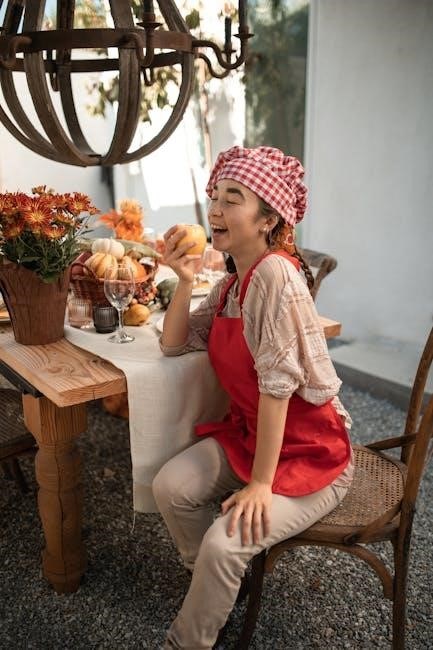Mastering Adult ADHD offers a comprehensive guide to understanding and managing ADHD in adults, providing evidence-based strategies for improving daily functioning and overall well-being.
1.1 Understanding the Importance of Managing Adult ADHD
Managing adult ADHD is crucial for improving daily functioning, relationships, and overall quality of life. Untreated ADHD can lead to challenges in organization, time management, and emotional regulation, impacting career and personal well-being. Effective management strategies, such as cognitive-behavioral techniques, empower individuals to overcome these obstacles. By addressing these issues, adults with ADHD can enhance focus, reduce impulsivity, and achieve their goals. This guide provides a comprehensive approach to mastering ADHD, combining self-help tools with professional support.
1.2 Overview of the PDF Guide and Its Benefits
This comprehensive PDF guide is designed to help adults with ADHD take control of their lives. It offers actionable strategies, practical tools, and evidence-based approaches to manage symptoms. From understanding diagnosis to implementing daily strategies, the guide covers essential topics. It also emphasizes the importance of self-care, support systems, and long-term growth. By following the guide, individuals can improve focus, organization, and emotional regulation, leading to a more balanced and fulfilling life.
Understanding Adult ADHD
Adult ADHD impacts daily functioning, relationships, and mental health. Recognizing its effects is crucial for effective management and improving overall well-being through tailored strategies and support.
2.1 Common Symptoms and Their Impact on Daily Life
Adult ADHD often manifests through symptoms like inattention, impulsivity, and hyperactivity. These can lead to challenges such as forgetfulness, missed deadlines, and disorganization, affecting work and personal life. Impulsivity may result in impulsive decisions, impacting finances and relationships. Hyperactivity can cause restlessness, making it difficult to focus during meetings or relax during leisure time. These symptoms can also lead to emotional challenges, such as frustration and low self-esteem, creating a cycle of stress and overwhelm in daily routines.
2.2 How Adult ADHD Differs from Childhood ADHD
Adult ADHD differs from childhood ADHD in its presentation and impact. While children often exhibit overt hyperactivity and impulsivity, adults may experience more subtle symptoms like inattentiveness, disorganization, and emotional dysregulation. Adults with ADHD are more likely to struggle with time management, relationships, and workplace challenges. The condition may also manifest as chronic procrastination or low motivation, rather than the hyperactive behaviors seen in children. This shift in symptoms can make adult ADHD harder to diagnose and address effectively.
2.3 The Role of Cognitive-Behavioral Strategies
Cognitive-behavioral strategies are essential for managing adult ADHD. These techniques help individuals identify and challenge negative thought patterns, replacing them with constructive ones. CBT also focuses on developing practical skills to improve organization, time management, and impulse control. By addressing both thoughts and behaviors, these strategies empower adults to better navigate daily challenges, reducing stress and improving overall functioning. Regular practice of CBT techniques can lead to lasting improvements in focus and emotional regulation.
Diagnosis and Treatment Options
Diagnosis involves clinical evaluation and symptom assessment. Treatment options include medication, therapy, and lifestyle changes, tailored to individual needs for effective ADHD management and improved quality of life.
3.1 Recognizing Signs and Symptoms
Recognizing adult ADHD signs involves identifying persistent patterns of inattention, hyperactivity, and impulsivity. Common symptoms include difficulty completing tasks, forgetfulness, disorganization, and impulsive behaviors. Adults may struggle with time management, frequently losing items, or experiencing emotional dysregulation. These symptoms can significantly impact daily life, relationships, and work performance. Accurate diagnosis requires a comprehensive evaluation by a qualified professional, such as a psychologist or psychiatrist, to assess symptom severity and rule out other conditions.
3.2 The Role of Medication in Treatment
Medication is often a cornerstone in managing adult ADHD, helping reduce symptoms like inattention and impulsivity. Stimulants and non-stimulants are commonly prescribed to improve focus and impulse control. Medications can enhance daily functioning and quality of life. However, they must be tailored to individual needs and closely monitored by a healthcare provider. It’s important to combine medication with lifestyle changes and therapy for optimal results and to address potential side effects effectively.
Cognitive-Behavioral Therapy (CBT) is a powerful tool for managing adult ADHD, focusing on identifying and changing negative thought patterns and behaviors. It helps individuals recognize how their thoughts influence actions and develop strategies to improve focus, organization, and emotional regulation. CBT is often tailored to address specific ADHD challenges, such as procrastination or impulsivity, and can be used alongside medication for comprehensive care. Regular practice and self-reflection are key to its success.

Cognitive-Behavioral Therapy for ADHD
Cognitive-Behavioral Therapy (CBT) is a structured approach to managing ADHD, focusing on identifying and changing negative thought patterns and behaviors to improve daily functioning and reduce symptoms.
4.1 Identifying and Challenging Negative Thought Patterns
CBT helps individuals recognize and challenge negative thought patterns that exacerbate ADHD symptoms. By identifying distorted or unhelpful beliefs, adults can replace them with more balanced and constructive thinking. This process fosters better decision-making, improved self-esteem, and reduced impulsivity. Regular practice of cognitive restructuring can lead to long-term changes in how thoughts and emotions are managed, enhancing overall well-being and daily functioning.
4.2 Behavioral Strategies for Managing Symptoms
Behavioral strategies are essential for managing ADHD symptoms. Techniques like creating structured routines, breaking tasks into smaller steps, and using external reminders can enhance productivity. Positive reinforcement, such as rewards for completing tasks, helps build motivation. Environmental adjustments, like minimizing distractions, improve focus. These practical approaches empower individuals to better regulate their behavior, reduce impulsivity, and maintain consistency in daily activities, leading to improved overall functioning and reduced stress.
4.3 The Importance of Thought Awareness and Reflection
Developing thought awareness and reflection is crucial for managing ADHD. Recognizing negative thought patterns helps individuals challenge and reframe unproductive beliefs. Regular reflection allows for better understanding of triggers and behaviors, fostering self-awareness. Tools like journaling or mindfulness practices can enhance this process, promoting emotional regulation and improved decision-making. By cultivating these skills, individuals can gain greater control over their thoughts and actions, leading to more balanced and intentional living.

Practical Strategies for Daily Life
Master practical techniques to enhance daily functioning, including time management, organization, and focus improvement. Utilize tools like planners, task prioritization, and environmental adjustments to boost productivity and reduce stress.

5.1 Time Management and Organization Techniques
Effectively managing time and staying organized are crucial for adults with ADHD. Use tools like planners, digital calendars, and task apps to structure your day. Break tasks into smaller, manageable steps and prioritize them using the Eisenhower Matrix. Create a dedicated workspace and implement routines for consistency. Consider time-blocking to allocate specific periods for tasks, reducing procrastination. Incorporate visual reminders and checklists to stay on track and celebrate small accomplishments to build motivation.
5.2 Improving Focus and Reducing Distractions
Enhancing focus and minimizing distractions is vital for adults with ADHD. Create a quiet, clutter-free workspace and use noise-canceling headphones to reduce sensory overload. Prioritize tasks using the Pomodoro Technique, working in 25-minute intervals with short breaks. Limit digital notifications and use apps that block distracting websites. Practice mindfulness to stay present and avoid multitasking, which can worsen focus. Break tasks into smaller steps to reduce overwhelm and maintain concentration. Regular breaks and physical activity can also refresh your mind and boost productivity.
5.3 Tips for Enhancing Emotional Regulation
Enhancing emotional regulation is crucial for managing ADHD. Practice mindfulness and deep breathing exercises to calm impulsivity. Identify triggers and develop coping strategies, such as journaling or grounding techniques. Use positive self-talk to reframe negative emotions. Set clear boundaries to reduce stress and overwhelm. Incorporate physical activity, like yoga or walking, to release tension. Consider therapy to develop emotional awareness and resilience. Consistency in these practices helps stabilize emotions and improves overall well-being.

The Role of Self-Help and Support Systems
Self-help techniques empower individuals with ADHD to manage symptoms effectively. Building a strong support system enhances accountability and provides emotional backing, fostering resilience and overall well-being.
6.1 Utilizing Workbooks and Online Resources
Workbooks and online resources offer structured strategies for managing ADHD, providing practical exercises and tools. They help individuals develop self-awareness, organization, and time management skills. Digital apps and guides often include customizable plans, catering to unique needs. These resources complement professional advice, offering accessible support for daily challenges. By leveraging these tools, adults with ADHD can build consistent routines and improve focus, enhancing overall productivity and confidence in their abilities.
6.2 Building a Support Network
Building a strong support network is vital for managing ADHD effectively. Surrounding yourself with understanding family, friends, and peers provides emotional backing and practical assistance. Joining ADHD support groups connects you with others facing similar challenges, fostering camaraderie and shared solutions. Professional guidance from coaches or therapists further enhances your support system, ensuring tailored strategies and encouragement. A robust network helps alleviate isolation, boosts motivation, and promotes long-term success in managing ADHD.
6.3 The Importance of Mindfulness and Self-Care
Mindfulness and self-care are essential for managing ADHD. Practices like meditation, deep breathing, and yoga help reduce stress and improve focus. Regular self-care routines, such as exercise and adequate sleep, enhance emotional regulation and overall well-being. By prioritizing mindfulness, individuals can better navigate ADHD challenges, fostering a balanced and fulfilling life. These practices promote self-awareness, helping adults with ADHD maintain consistency and resilience in their daily routines.
Advanced Strategies for Managing ADHD

Advanced strategies focus on refining skills like goal setting, technology use, and overcoming procrastination to enhance productivity and motivation, tailored for long-term ADHD management success.
7.1 Setting Realistic Goals and Celebrating Progress
Setting realistic goals helps break tasks into manageable steps, reducing overwhelm. Use SMART criteria to ensure goals are specific, measurable, achievable, relevant, and time-bound. Celebrate progress, no matter how small, to build motivation and confidence. Recognizing milestones reinforces positive behavior and encourages persistence. This approach fosters a growth mindset, helping adults with ADHD stay focused and committed to their objectives. Regular reflection on achievements enhances self-awareness and overall well-being.
7.2 Using Technology to Your Advantage
Technology can be a powerful tool for managing ADHD. Apps like reminders, timers, and task managers help stay organized. Focus-enhancing tools, such as website blockers, reduce distractions. Digital planners and calendars improve time management. Automation tools streamline repetitive tasks, saving time and effort. Technology also provides accountability, offering reminders and progress tracking. By leveraging these tools, adults with ADHD can create structured routines and improve productivity, making daily life more manageable and stress-free.
7.3 Overcoming Procrastination and Building Motivation
Breaking tasks into smaller, manageable steps helps reduce overwhelm and increase focus. Setting clear, achievable goals and deadlines boosts motivation. Techniques like the Pomodoro method, which alternates work and breaks, can enhance productivity. Establishing accountability through check-ins with a partner or therapist also helps. Celebrating small wins fosters a sense of accomplishment, reinforcing positive habits. Consistency and self-compassion are key to building lasting motivation and overcoming procrastination effectively.

Legal and Financial Considerations
Understanding legal rights, workplace accommodations, and financial strategies is crucial for managing ADHD effectively. This section provides guidance on navigating these areas with confidence and clarity.
8.1 Understanding Your Rights in the Workplace
Understanding your workplace rights is essential for managing ADHD effectively. Under the ADA, employers must provide reasonable accommodations, such as flexible work hours or a quiet workspace. Employees have the right to request modifications that enable productivity without discrimination. Confidentiality is protected, and documentation from a healthcare provider can support accommodation requests. Knowing these rights empowers individuals to advocate for themselves and create a work environment that fosters success and inclusion.
8.2 Managing Finances Effectively
Managing finances effectively is crucial for adults with ADHD to reduce stress and improve stability. Strategies like budgeting apps, automated savings, and the 50/30/20 rule can help organize expenses. Breaking financial tasks into smaller steps prevents overwhelm. Impulse spending can be curbed by implementing a 24-hour waiting period for non-essential purchases. Regular financial reviews and setting clear goals enhance accountability and long-term planning, fostering a sense of control and confidence in monetary decisions.
8.4 Navigating Healthcare and Insurance Options
Navigating healthcare and insurance options can be complex for adults with ADHD. Understanding your insurance coverage for ADHD treatments, therapies, and medications is essential. Researching providers and plans that specialize in ADHD care ensures better support. Utilizing online resources and reaching out to patient advocates can simplify the process. Regularly reviewing insurance policies and seeking professional guidance helps maximize benefits and access to necessary care, ensuring comprehensive support for managing ADHD effectively.

Long-Term Management and Growth
Mastering ADHD involves long-term strategies to sustain progress and foster personal growth. Setting realistic goals, practicing self-reflection, and embracing adaptability are key to lasting success and self-improvement.
9.1 Sustaining Progress Over Time
Sustaining progress with ADHD requires consistent effort and adaptability. Regularly reviewing goals, celebrating small achievements, and adjusting strategies as needed are essential. Incorporating daily routines, such as time management and self-care practices, helps maintain momentum. Tracking progress through journals or apps provides accountability and insight. Embracing a growth mindset and being open to change ensures long-term success. Over time, these habits become second nature, fostering resilience and continued improvement in managing ADHD effectively.
9.2 Embracing Your Unique ADHD Mindset
Embracing your ADHD mindset involves accepting and leveraging your unique strengths, such as creativity, energy, and out-of-the-box thinking. Recognize that ADHD brings both challenges and opportunities. By focusing on your strengths and adapting strategies to your lifestyle, you can turn perceived weaknesses into advantages. Celebrate your differences and use them to fuel productivity and innovation; Self-compassion and confidence are key to thriving with ADHD, allowing you to view it as a distinct aspect of your identity rather than a limitation.
9.3 Continuous Learning and Adaptation
Continuous learning and adaptation are essential for long-term ADHD management. Stay informed about new strategies, tools, and research to refine your approach. Regularly assess what works and adjust as needed. Embrace flexibility and openness to change, fostering resilience. Engage in workshops, webinars, and self-help materials to stay updated. By committing to lifelong learning, you can adapt strategies to meet evolving challenges and maintain progress in managing ADHD effectively over time.

Community and Professional Support
Building a strong support network enhances ADHD management. Connecting with others who understand your challenges provides practical advice, emotional support, and accountability. Professional guidance from therapists and coaches, combined with peer support groups, fosters empowerment and sustained progress. This collective approach helps individuals navigate unique difficulties and celebrate successes, creating a resilient foundation for long-term well-being.
10.1 Finding the Right Therapist
Finding a therapist skilled in adult ADHD is crucial for effective management. Look for professionals with expertise in ADHD, preferably those who use evidence-based approaches like CBT. A good therapist will understand your unique challenges and tailor strategies to your needs. They should foster a collaborative relationship, helping you build self-awareness and practical skills. Ensuring a strong therapeutic alliance can significantly enhance your progress and overall well-being. Taking the time to find the right fit is an investment in your long-term success.
10.2 Engaging in Support Groups
Engaging in support groups can be a powerful way to connect with others who understand the challenges of adult ADHD. These groups provide emotional support, practical advice, and a sense of community. Sharing experiences and strategies can help reduce feelings of isolation and foster resilience. Many groups are led by professionals or experienced individuals, offering guidance and resources. Participating regularly can lead to meaningful connections and ongoing motivation, enhancing your journey toward managing ADHD effectively.
10.3 Leveraging Online Communities and Forums

Leveraging online communities and forums can provide invaluable support and resources for managing adult ADHD. These platforms offer accessible spaces to connect with others facing similar challenges. Many communities are anonymous, allowing for open sharing without fear of judgment. Online forums often feature expert advice, shared experiences, and practical tips. They also provide 24/7 access to information and support, making them a flexible and convenient resource for ongoing learning and growth. Active participation can enhance your ADHD management journey significantly.
